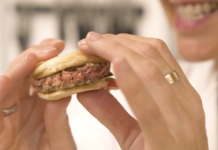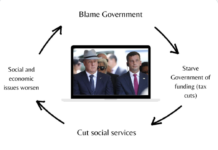We hear about the benefits of Gene Editing, but what about the risks?
When it comes to navigating an ethical biotechnology strategy for the future, there are questions to be asked and different types of risk to be considered.
What is the value to Brand New Zealand of a future committed to agroecology and producing food more naturally? How does this compare to a future of industrial, intensive, artificial food with claims of sustainability?
Nobody seems to agree on which direction represents the best chance of real action on climate change. Right now industry is largely ignoring proven solutions such as stock management and mixed feed for methane reduction.
Science has an important role in making our farming more sustainable but there are different kinds of science.
Medical gene science is pretty much accepted as it is carefully regulated and can be controlled.
But the public’s appetite for the risks of Gene Editing in the open environment is different.
Claims that only biotechnology can save us and that we must release Gene Edited organisms into the environment in order to fix climate change, are not credible when existing alternatives are left on the shelf.
There are lessons to be learned from inaction on climate, and from past mistakes.
So what are the risks?
Climate Action Risk
Climate Action is being delayed by people waiting for technical fixes and magic bullets. It turns out that fake meat may have benefits for animal welfare but may be useless for responding to climate change. New Scientist reports that lab-grown meat could be 25 times worse for climate than beef.
The promise of creating GE-ryegrass has allowed long delays in taking action to help farmers reduce methane. There is an opportunity-cost for New Zealand in delaying the transition to sustainability.
Scientific Risk
Gene Editing is not fool proof, and things go wrong.
‘Hornless cows’ are one of the first Gene Edited products launched to market. It was only later that unexpected foreign DNA was discovered. “They had a major screw up” said the headline in MIT Technology Review.
There is also the discovery of chaos in the genome from Gene Editing.
‘CRISPRthripsis’ is where several hundred genetic changes happen simultaneously in a catastrophic event with genetic material swapped, twisted, recombined or even lost. It was discovered in tomatoes. But it doesn’t just happen in tomatoes.
Animal Welfare Risk
Despite strict regulation there are examples of things going wrong before.
AgResearch has been called out on animal welfare by the NZ Herald when it reported the story of GE calves developing ovaries that ruptured and killed them. The headline ‘mutant cows die in GM trial‘ was not a good look for New Zealand either.
The destruction of 3000 GE sheep at Whakamaru was made necessary after the product they were genetically engineered to make, failed clinical trials. The company PPL went bankrupt.There was no insurance or bond to cover costs so the public had to pay to clean up the mess.
Ethical Risk
The regulation of GE must be informed by Te Ao Maori, settlement of Y262 and protection of the rights of indigenous peoples.
Human genetic engineering raises the prospect of eugenics, and unacceptable practices that the BioEthics Council was established to advise on. The need for a Technology Regulator across Biotechnology, AI, Nanotechnology and Synthetic Biology is made greater as technologies converge.
Environmental risk
In Europe, Environment Ministers are challenging the EU Commission to keep regulation on Genetic Edited products to protect the environment. They say the precautionary principle must be maintained. New Zealand must take heed.
Those arguing for the release of Gene Edited organisms say that the science has changed and we know more. We know more about ecology too, and about a crisis of biodiversity loss and chemical pollution from previous innovations that have had unintended consequences.
GE crops have increased use of glyphosate and other toxic chemicals as weeds have become resistant.
But solutions offered by future Gene Editing in the open field could be worse. Scientists are working on new pesticides comprising naked RNA combined with carbon nano-particles to penetrate plant and insect cells more easily, to be directly sprayed onto fields. The implications revealed in Frontiers (link below) is sobering, even for the most avid proponent of GE.
Reputational Risk
The trend for natural, ethical food applies to vegetarians as much as meat and dairy consumers.
Demand for plant based foods is about real climate action and animal welfare, not about investing in artificial lab-grown products.
New Zealand products, whether animal or non-animal, must focus on ‘natural’ in contrast to ‘fake’.
Fonterra and other exporters say their exports are advantaged by being GE-free and our brand association with Nature.
Stuff reports that Tesco, the biggest buyer of New Zealand products in Britain wants products that are sustainable, with the focus on biodiversity, soil health, water management, worker human rights and animal welfare.
It’s surprising that Silver Fern Farms chief executive Simon Limmer wants a review of genetic modification’ to give ”optionality’. If he is thinking options for ‘GE ryegrass’ or Gene Edited lamb, he needs to speak with the people at Tesco.
Insurance Risk
Arguably, the only organisations really expert in calculating risk are the Insurance companies. In the past they have refused to cover the risks of GE, so what should be commercial risk is ‘socialised’.
‘Polluter pays’ and requiring users of Gene Edited products to have commercial liability insurance are important tools to protect Brand New Zealand from unintended consequences of biotechnology.
Public trust that Gene Editing is ‘safe’ would be encouraged by the Insurance industry calculating and underwriting the risks.
Proponents of Gene Editing say “the science has changed”. Has the Insurance industry’s view of risk changed too?





“The regulation of GE must be informed by Te Ao Maori” Ah…Why?
well, its partly because many Maori people don’t want to eat GE/GMO foods, partly because of Te Titirit o Waitangi, and also Te Waka Kai Ora (certified Maori organic food/ Hua parakore). Rapt to see all councils from south Auckland to Cape Reinga in Far north and all Iwi authorities for their respective rohe (Bombay hills north to Reinga) have precautionay and prohibitive Ge/GMO policies xx
So Jon where was your voice when the MRNA vaccines were forced upon the population with little data on safety and none on long term effects?
Well said. GE food in NZ is all about huge profits for biotech companies with all risks socialised by taxpayers, ratepayers, farmers, and the entire human population including generations to come. Also the risks are to the ecology, and all life on earth if something goes horribly wrong.
Once this garbage is released into the environment there is no going back. The enthusiastic platitudes from the biotech-shills (who just happen to stand to make huge profits from this garbage) telling us their new wonder product ‘might’ reduce emissions slightly or ‘might’ be a bit more drought tolerant are meaningless in the face of actual naturally existing germplasm in plants such as plantain and cocksfoot grass that already exceed the ‘potential’ of the GE ryegrass.
The promises of GE have never been realised in actual tangible gains, and the consumer does not want to eat it. Going down the GE path would be incredibly stupid.
This is just another example of massive corporates playing God at the expense of all other life, with no true accountability.
Jon – The Corporates behind GE/GM behaviour towards Farmers is a huge problem as well…
Yes, there is a reason why farming is under heavy fire now days. It is not only because of climate change, it is also because there is a whole other industry being prepared to take its place. And I believe that money, not climate mitigation or public good motives, is the key driver behind this change. GE/GM/Fake food, cheap as chips to create/produce compared to standard farming methods I am guessing.
The science exists,most Scientists agree there is no risk.
This is good stuff, scary – this is a whole can of worms – that we haven’t even began to really think about, let alone wrap our heads around. This is an issue that duly deserves greater scrutiny.
After some deep rational thought in my senior years I now consider that the mass, organised, murder of Jewish people without the excuse of wanting their land or some other specious blah, was the line in the sand for any playing God particularly when there is no excuse like sure annihilation or attack from alien microbes et. H.G. Wells and his idea of biology destroying a whole species is far-seeing. We cannot allow those with wealth or just intense curiosity and greedy plans to interfere as of right and will to introduce genetic modification. This is serious human mischief against human society; even God doesn’t take responsibility for the serendipity happenings in the world.
There is no way that cold-hearted governments and financiers and nut-cases are going to make good the harm they cause, even if they are prepared to admit it. They will not be able to reverse the situation, much will be lost. So shut up you argufiers and get busy with advancing regenerative farm practices for all, looking how to do things better with what we have, advancing the notion of trees as being the props and shelters of society and further the work of finding more flame-resistant trees and how to use them best as fire breaks. Also of helping us understand the world of viruses and fungi and the value of isolation for periods for health purposes, both for individuals and for countries – not so much interchange which enables unplanned genetic modification through introduced things, seaweeds invasive, new cockroaches, new weeds, myrtle rust, and so it goes.
We humans are a devious bunch and often switch to callous mode when some outcome that we desire or saves us personally or benefits our ‘side’ occurs to us. Those who desire an honest, truthful perspective of humans have to be callous about putting away their shrinking aversion to examining their inner selves and look bravely into the mirror. Look cautiously behind the stage set of Titus Andronicus,* and at what violence we choose to watch on film and television.
* Titus Andronicus Summary. The Roman general Titus Andronicus returns from war with four prisoners who vow to take revenge against him. They rape and mutilate Titus’ daughter and have his sons killed and banished. Titus kills two of them and cooks them into a pie, which he serves to their mother before killing her too.
Summary of Titus Andronicus | Shakespeare Birthplace Trust
shakespeare.org.uk
https://www.shakespeare.org.uk › shakespear
Our inability to cope with controlling ourselves leads to puritanism which ends up being violently overthrown. Then finding a way to operate as practical, kindly people who must use force FTTT is the key but each generation has to agree and believe in the precepts. Once achieved and carried out controlled allowed behaviour can settle as the norm and considered immutable, but then can be rejected or circumvented by the next generation.
We cannot allow gene manipulation, and should put in detention as dangerous to society those who transgress the prohibition. For agreement to allow certain work for good reasons there would have to be a referendum, carried out fairly and flawlessly, requiring a 90% majority based on the number of all adult citizens. And the work would have to be carried out under constant scrutiny, time and personnel limited, and under national control and ownership, and even that would not prevent all malfeasance/malpractice and illegality. All the world is a game of plots, plans and rewards to those whose main interest is in enriching themselves. But few consequences will be considered or stay the hand/s.
Titus Andronicus Summary. The Roman general Titus Andronicus returns from war with four prisoners who vow to take revenge against him. They rape and mutilate Titus’ daughter and have his sons killed and banished. Titus kills two of them and cooks them into a pie, which he serves to their mother before killing her too.
Summary of Titus Andronicus | Shakespeare Birthplace Trust
shakespeare.org.uk
https://www.shakespeare.org.uk › shakespear
“Mutant cows die in GM trial” – NZ Herald (who else? perhaps in the Daily Fail as well)
Ooooh, scary! Makes for good headline fodder to frighten the masses. Evil gubmint scientists making mutants.
But making mutants was the object of the exercise. Nature makes millions and millions of mutants every single second of every day. The vast, vast, vast majority are not viable, and in respect to animals seldom make it past gestation, those that do usually suffer premature death or, rarer, succeed in passing on their mutation. Just occasionally, damaged specimens find refuge in right wing political parties where they they are nurtured in a self supporting artificial soup.
(It’s all known as evolution, and no gods are required).
The lucky (or unlucky) animals under discussion had the very best prenatal care and monitoring, very likely contributing to their surviving their gestation. But gee, they died.
Ever taken a tour of a farm during lambing season (don’t tread in the placentas) ? I believe in some places its viable to send special trucks out to collect the tiny cadavers.
Excellent article. Our farming family is appalled at the thought of outdoor GE/GMO (including “gene edited organisms”) experiments / field trials or releases in NZ. There are way too many vectors for GE/GMO contamination (including wind, pollen, seeds, soils, waterways, machinery, animals, insects, floods, other extreme weather events, on top of human error). We only support ethical and humane experiments with GMOs in the strict containment of the laboratory.